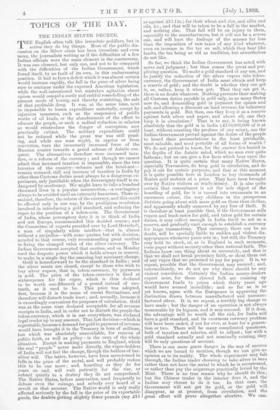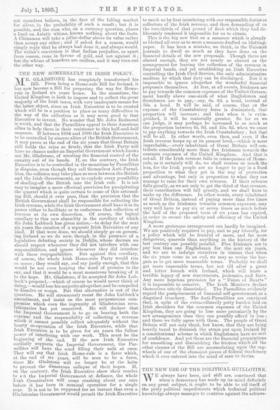TOPICS OF THE DAY.
THE INDIAN SILVER DECREE. THE English often talk like irresolute peddlers, but in action they do big things. Most of the public dis- cussion on the Silver crisis has been irresolute and even mean, the journalists writing as if the difficulties of a few Indian officials were the main element in the controversy. It was one element, but only one, and not to be compared with the difficulties of the Indian Government, which found itself, by no fault of its own, in this embarrassing position. It had to face a deficit which it was almost certain would increase rapidly, the fall in the price of silver being sure to continue under the expected American legislation, while the well-intentioned but mistaken agitation about opium would compel a costly and riskful remodelling of the present mode of taxing, and thereby restricting, the sale of that profitable drug. It was, at the same time, next to impossible to lessen expenditure materially, except by injurious measures, such as the suspension of public works of all kinds, or the abandonment of the effort to educate the people, or such a radical reduction in salaries as would reintroduce the danger of corruption, now practically extinct. The military expenditure could not be reduced while the great war was still pend. ing, and while one man might, in caprice or from conviction, turn the immensely increased force of the Russian armies towards a grand scheme of Asiatic con- quest. The alternatives therefore were increased taxa- tion, or a reform of the currency ; and though we cannot admit that increased taxation is impossible, since the two luxuries of the country—tobacco and the betel-nut-- remain untaxed, still any increase of taxation in India by other than Customs duties must always be a dangerous ex- periment, only justifiable when the Sovereignty itself is en- dangered by insolvency. We might have to take a hundred thousand lives in a popular insurrection,—a, contingency always to be avoided until an extremity has arisen. There re- mained, therefore, the reform of the currency, and this could be effected only in one way, by the prodigious revolution involved in introducing a gold standard, and reducing the rupee to the position of a token-coin. The Government of India, whose peremptory duty it is to think of India and not Europe, recommended this decided course ; and the Committee of experts presided over by Lord Herschel], aman of singularly white intellect—that is, almost without a prejudice—with some qualms but with decision, acceded to that course, only recommending great caution in fixing the changed value of the silver currency. The Indian Government accepted that caution, and on Monday used the despotic power which it holds always in reserve, to make in a single day the amazing but necessary change. Gold is henceforward to be the standard in India ; and the silver mints are closed, except to those who wish to buy silver rupees, that is, token-currency, by payments in gold. The price of the token-currency is fixed at sixteenpence for the rupee, which is thus declared to be worth one-fifteenth of a pound instead of one- tenth, as it used to be. This price was adopted, first, because it is the mean of recent fluctuations, and therefore will disturb trade least ; and, secondly, because it is exceedingly convenient for purposes of calculation. Gold was at the same time declared acceptable for all revenue receipts in India, and in order not to disturb the people the token-currency, which is in use everywhere, was declared legal tender up to any amount. That last decision—which is regrettable, because a demand for gold in payment of revenue would have brought it to the Treasury in tens of millions, but which was absolutely unavoidable, for reasons of public faith, as well as policy—is the crux of the whole situation. Except in making payments to England, which the real " people " never make directly, the rupee-holders of India will not feel the change, though the holders of bar- silver will. The latter, however, have been accustomed to falls in the price of the metal, and will probably reckon this to be one more ; and, hoarding as they do for years on end, will wait patiently for the rise, or submit quietly to a destiny they do not comprehend. The Native States, before annexation, used frequently to debase even the coinage, and nobody ever heard of a revolt on that account. The Native world is only really affected seriously by the fall in the price of its exportable goods, the dealers getting slightly fewer pounds (say £15 as against £15 12s.) for their wheat and rice, and silks and oils, &c., and that will be taken to be a fall in the market,.
and nothing else. That fall will be an injury to them,. especially to the manufacturers, but it will not be a severe one, and will hurt the feelings of the masses far less than the imposition of new taxes of any kind whatever, even an increase in the tax on salt, which they bear like lambs, the tax being as old as tradition, but nevertheless. do not like.
So far, we think the Indian Government has acted with nerve and judgment ; but then comes the great and per- plexing question. To make a gold standard of any use, and" to justify the reduction of the silver rupees into token- currency, the Government of India must obtain and keep a reserve of gold ; and the doubt is whether they can get it, or, rather, keep it when got. That they can get it, there is no doubt whatever. Nothing prevents their making all Customs duties payable in gold only, as so many States now do, and demanding gold in payment for opium and salt, and allowing a discount on land revenue for voluntary payments in gold. But then, can they keep it as a reserve against both silver and paper, and above all, can they keep it in circulation ? That is to say, it being known absolutely that the gold is in India (X150,000,000 of it at least, without counting the produce of any mine), can the Indian Government prevail against the desire of the people to hoard their accumulations in the least perishable. most saleable, and most portable of all forms of wealth ? We do not pretend to know, for the answer lies buried in the depths of the Asiatic mind, which no man ever quite fathoms ; but we can give a few facts which bear upon the question. It is quite certain that many Native States,. especially Travancore, do keep gold in circulation, and do pay it out for certain purposes, and that at this moment it is quite possible here in London to buy thousands of Native gold mohurs at a price. They have been brought over by Native visitors as ready-"Money. It is also quite. certain that concealment is not the sole object of the hoarding of gold, for it is turned into ornaments to an enormous extent, the very children in the prosperous districts going about with more gold on them than clothes, and apparently wholly unmoved by any fear of theft. It is therefore at least possible that, if the Government sells rupees and bank-notes for gold, and takes gold for certain duties, it may collect enough in India itself to act as a. reserve, and gradually emit enough to establish a currency for large transactions. That currency, there can be no doubt, will be specially liable to sudden and. violent dis- appearances whenever panic sets in ; but still, the Treasury may hold its stock, or, as in England in such moments,. issue paper without security other than national faith. The Indians know one thing about us accurately, and that is that we shall not break pecuniary faith, or cheat them out of any rupee that we promised to pay for paper. It is, we repeat, possible that the Government may succeed ; and, intermediately, we do not see why there should be any violent convulsion. Certainly the Indian money-dealers expect none, for those shrewd folk are running up Government funds to prices which thirty years ago. would have seemed incredible ; and so far as is as yet known, agree with the Europeans in approving the distinction drawn between manufactured and unmanu- factured silver. It is, we repeat, a terribly big change to have made ; but the danger of an operation is not always measurable by its bigness, and it may succeed. If it does, the advantage will be worth all the risk, for India will have a gold standard, and its enormous currency problem will have been ended, if not for ever, at least for a genera- tion or two. There will be many complicated questions, both of taxation and salaries, still to adjust ; but with a. gold standard actually and not nominally existing, they will be only questions of account.
There is one more grave danger in the way of success which we are bound to mention, though we can give no opinion as to its reality. The whole experiment may fall through, the Indian trader choosing to take silver in bars rather than not have the metal to which he is accustomed, or rather than pay the seignorage practically levied by the Mint. There is no true reason why he should do this „ but the Chinese trader in the interior does it, and the Indian may choose to do it too, In that case, the Government will not get its gold, or the gold will disappear, as at present, from circulation, and. the great effort will prove altogether abortive. We can- not ourselves believe, in the face of the falling market for silver, in the probability of such a result ; but it is possible, and; the man who, on a currency question, places a limit on Asiatic whims, knows nothing about the facts. A Chinaman will take a pillar-dollar above its value rather than accept any other ; and if asked for a reason, would simply reply that he always had done it, and always would. The writer's conviction is that Indian prejudice, as apart from reason, runs in favour of gold, and not against it ; but the whims of hoarders are endless, and it may turn out the other way.











































 Previous page
Previous page